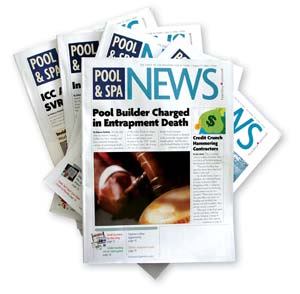The U.S. Consumer Product Safety Commission has delayed its clarifications regarding hot tubs and the Virginia Graeme Baker Pool and Spa Safety Act.
Late last year, portable spa makers began questioning whether hot tubs had to comply with the drain-cover portion of the law, which states that all such products entered into commerce after Dec. 19, 2008, must meet the standards of ASME/ANSI A112.19.8 – 2007.
Hot-tub manufacturers needed to know: Can hot tubs made before Dec. 19 be sold with noncompliant drains? It seemed that a decision from the CPSC was imminent, when an unrelated court case caused a delay.
Recently, a law was passed limiting the use of chemicals called phthalates in the making of children’s products. Amid fears by retailers that the ban would shut them down, CPSC stated that they could sell products with more-than-allowed phthalates if they were made before the Feb.10, 2009, deadline.
A U.S. District Court in New York overturned CPSC’s ruling, stating that only compliant products can be sold, regardless of when they were manufactured. After that ruling, CPSC chose to step back and re-analyze how to address portable hot tubs.
APSP’s general counsel, Steven Getzoff, sent CPSC an analysis on behalf of the pool and spa association. He believes the circumstances are different enough that CPSC still should allow pre-existing hot-tub inventory to enter the market.
For one thing, he said, the VGB Act states that the law should be treated “as if promulgated by the CPSC,” making it a Consumer Product Safety Standard. These apply only to products made after the effective date.
In addition, he said, the language in the other law places a prohibition on phthalates. “[VGB] says as of this date, all drain covers shall comply with the ASME standard,” said Getzoff, a senior litigation partner with New York law firm Lester Schwab Katz and Dwyer. “That, as I read it, is not a prohibition but a performance requirement. That would be the type of thing that would only apply to products manufactured after the effective date.”
Finally, he said, the law states that phthalates pose dangers to children. “There has been no indication or evidence ever presented that there is a danger of entrapment in portable hot tubs that comply with the [ANSI/ APSP] hot tub standard or the ANSI-7 [entrapment] standard,” Getzoff said. “While Congress was clearly addressing a potential danger in swimming pools and inground spas, there’s no indication that there was any concern expressed with regard to portable spas or hot tubs.”
In the meantime, hot tub manufacturers and retailers must decide whether to sell their products.
“They have product on their floors and they’re just not sure … if they can legally sell those tubs or not,” said Steve Gorlin, chairman of the APSP Hot Tub Council. “It’s putting them in a precarious position.
